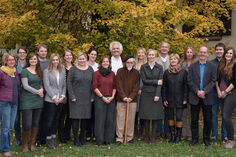About the Importance of Postpartum Depression for the Mother-Child-Relationship and Child Development
Funded by the Volkswagen-Foundation
Coordinator:
Prof. Dr. phil. Dipl.-Psych. Corinna Reck, Ludwig-Maximilians-University Munich, Heidelberg University Hospital
Cooperation:
Research Projekt: „Soziales Gehirn: Das Gehirn – Ein Beziehungsorgan: Interdisziplinäre Perspektiven auf die Entwicklung sozial induzierter Fähigkeiten“
Coordinator: Prof. Dr. med. Dr. phil. Thomas Fuchs, Heidelberg University Hospital
Correspondence:
Ms. Nora Nonnenmacher
Phone: +49 6221/ 56 37006
Objective and background:
Subject of this study is the development of social abilities. More precisely, the intuitive competences of mothers when interacting with their babies, infants’ social-cognitive development and the quality of attachment within the first 18 months of life are analyzed.
Previous research impressively documented that mothers have a broad repertoire of interaction behavior that complements well to infant’s developmental deficits and is spontaneously available within the mother-infant-interaction (e. g. motherese or imitation). It is not yet clear whether a successful initiation of these intuitive competences depends on a mother’s own early positive attachment experiences. To clear up this question this study examines the processes of affect tuning between mothers and their three months old infants during a Still Face-Situation. Furthermore, it investigates these dyadic interaction patterns with regard to present maternal attachment representations, own parenting and traumatic experiences during childhood and adolescence.
Special attention is paid to the comparison between mother-infant-dyads with healthy mothers and postpartum depressed mothers. It is already known that the interaction behavior of the latter is characterized by more negative affect, lack of responsivity and increased passivity - a behavior associated with a lack of intuitive competences and that interferes with interaction processes which in turn can negatively affect child development. It is yet uncertain under which conditions mothers can activate their intuitive competences despite an acute depressive disorder and which specific factors (e. g. present maternal secure attachment) enable such activation. This question is particularly relevant with regard to the development of specific mother-infant-centered therapeutic interventions.
Procedure:
In a prospective longitudinal section design, the development of infant cognitive and emotional structures is examined. Therefore, besides the first examination at an infant age of three to four months, infants are examined at the age of 9, 12 and 18 months with their mothers.
The possible impact of specific characteristics of early mother-infant-interaction and present maternal attachment representations on infant social-cognitive development (e. g. communication skills and object representation) and infant cognitive development is assessed. Besides observable behavior, associated neurophysiologic parameters of mother and infant (e. g. cortisol, heart rate and EEG) are measured.



